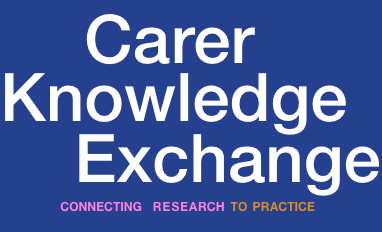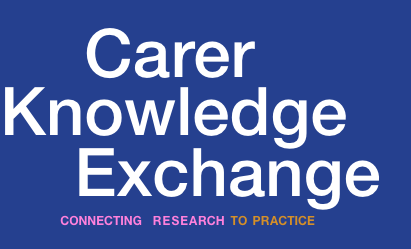Research Library
The Carer Knowledge Exchange Research Library is a collection of recent Australian publications and other resources that contain reliable research about family and friend carers. It is constantly being added to, and you can suggest research to be included here.
There are two main ways to use the Research Library. The first is to search using the fields below. The second is to browse by category lower down the page.
For help using the Research Library, click here.
Please also see our Frequently asked questions page.
The publications in this research library may contain references to sensitive issues and cause distress. If you or someone you are with is in immediate danger, please call 000. If you feel upset or are in distress, you can contact Lifeline, 24 hours a day, 7 days a week by phoning 13 11 14 or texting 0477 13 11 14. For other information on support for carers please visit our support for carers page.
-
Add your research
Is something important missing from the Research Library? Share your research or suggest research by another author using our submission form. For more information about how to create an account click here and for more information about how to upload a publication to the research library click here.
My Research
Your Results
Filter my Results
Use the ‘filter my results’ function to further refine your search results. If you would like to start a new search, please use the ‘search for a resource’ function above
Your search has returned 70 results
-
1.7.2022
Exposure to risk and experiences of river flooding for people with disability and carers in rural Australia
Jodie Bailie, Veronica Matthews, Ross Bailie, Michelle Villeneuve, Jo Longman
This article explores the experiences of people with a disability and their carers during and following a flooding event.
-
24.5.2006
An exploratory study of GP awareness of carer emotional needs in Western Australia
Caroline Bulsara, Noreen Fynn
This article reports on an exploratory telephone survey conducted by Carers Western Australia to assess the awareness of carer needs and issues of general practitioners (GPs) in Western Australia and the way in which GPs perceive their role in providing information and support to carers.
-
20.1.2022
Looking beyond hours of care
Andreea Constantin, Myra Hamilton, Nate Zettna, Marian Baird, Daniel Dinale, Lisa Gulesserian, Alison Williams
This article explores the experiences of carers of a person with a disability when they withdraw from work, revealing that care strain can impact on all dimensions of paid employment.
-
1.11.2020
Head-to-head comparison of the psychometric properties of 3 carer-related preference-based instruments
Nikki McCaffrey, Jessica Bucholc, Stacey Rand, Renske Hoefman, Anna Ugalde, Anne Muldowney, Cathrine Mihalopoulos, Lidia Engel
This study investigated the measurement properties of preference-based instruments that aim to assess the impact of providing informal care on a carers social life and their caring experience.
-
11.7.2019
Understanding rural caregivers’ experiences of cancer care when accessing metropolitan cancer services
Anna Ugalde, Sarah-May Blaschke, Anna Boltong, Penelope Schofield, Sanchia Aranda, Jo Phipps-Nelson, Suzanne K. Chambers, Meinir Krishnasamy, Patricia M. Livingston
This study explored the experiences of carers of people with cancer who reside in rural Australia. Specifically, this study explored this cohort's experience in accessing metropolitan cancer health services.
-
13.2.2019
Identifying priorities for cancer caregiver interventions
Sarah-May Blaschke, Sylvie Lambert, Patricia M. Livingston, Sanchia Aranda, Anna Boltong, Penelope Schofield, Suzanne K. Chambers, Meinir Krishnasamy, Anna Ugalde
This study investigated the best ways in which caregivers for people with cancer can be supported.
-
20.5.2022
Use of parental disability trajectories to identify adolescents who are young carers
Tania L. King, Marissa Shields, Martin O’Flaherty, Anne Kavanagh, Matthew J. Spittal
This study revealed that parental disability may be an important way for service providers to better identify and subsequently support young carers.



